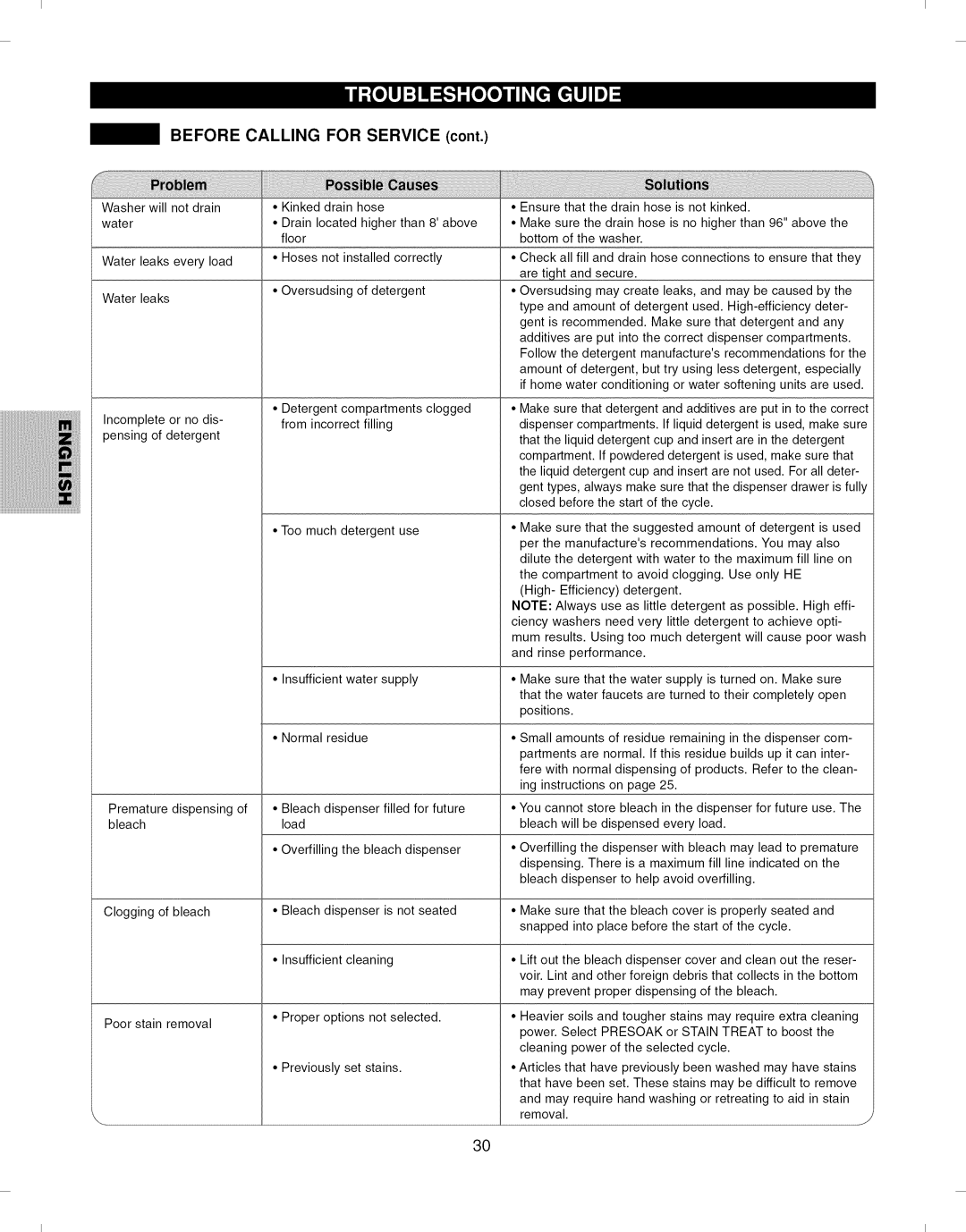
II
BEFORE CALLING FOR SERVICE (cont.)
Washer will not drain water
Water leaks every load
Water leaks
Incomplete or no dis- pensing of detergent
• Kinked drain | hose | ° Ensure that the drain | hose | is not kinked. |
|
| |||||||
• Drain located higher than 8'above | ° Make sure the drain | hose | is no higher than 96" above the | ||||||||||
floor |
|
| bottom | of the washer. |
|
|
|
|
| ||||
• Hoses not installed correctly | ° Check | all fill and | drain hose connections | to ensure | that they | ||||||||
|
|
| _ht | and secure. |
|
|
|
|
|
| |||
• Oversudsing | of detergent | ° Oversudsing | may create | leaks, | and may | be caused | by the | ||||||
|
|
| type and amount of detergent used. | ||||||||||
|
|
| gent is recommended. Make sure that detergent and any | ||||||||||
|
|
| additives are put into the correct dispenser compartments. | ||||||||||
|
|
| Follow the detergent manufacture's recommendations for the | ||||||||||
|
|
| amount of detergent, but try using less detergent, especially | ||||||||||
|
|
| if home water conditioning or water softening units are used. | ||||||||||
° Detergent | compartments clogged | ° Make sure | that detergent | and additives are put in to the correct | |||||||||
from incorrect | filling | dispenser | compartments. | If liquid detergent | is used, make sure | ||||||||
|
|
| that the liquid detergent cup and insert are in the detergent | ||||||||||
|
|
| compartment. If powdered detergent is used, make sure that | ||||||||||
|
|
| the liquid detergent cup and insert are not used. For all deter- | ||||||||||
|
|
| gent types, always make sure that the dispenser drawer is fully | ||||||||||
|
|
| closed before the start of the cycle. |
|
| ||||||||
• Too much | detergent use | • Make | sure | that the suggested | amount of detergent | is used | |||||||
|
|
| per the manufacture's recommendations. You may also | ||||||||||
|
|
| dilute the detergent with water to the maximum fill line on | ||||||||||
|
|
| the compartment to avoid clogging. Use only HE |
| |||||||||
|
|
| (High- | Efficiency) | detergent. |
|
|
| |||||
|
|
| NOTE: Always use as little detergent as possible. High effi- | ||||||||||
|
|
| ciency washers need very little detergent to achieve opti- | ||||||||||
|
|
| mum results. Using too much detergent will cause poor wash | ||||||||||
|
|
| and rinse performance. |
|
|
|
|
|
| ||||
° Insufficient | water supply | ° Make sure that the water | supply is turned | on. Make | sure | ||||||||
|
|
| that the water faucets are turned to their completely open | ||||||||||
|
|
| positions. |
|
|
|
|
|
|
|
|
| |
|
| ° Normal | residue |
|
Premature | dispensing of | ° Bleach | dispenser | filled for future |
bleach |
| load |
|
|
|
| • Overfilling the bleach dispenser | ||
Clogging of bleach | ° Bleach | dispenser | is not seated | |
|
| ° Insufficient cleaning | ||
Poor stain | removal | ° Proper | options not selected. | |
|
|
| ||
° Previously set stains.
30
°Small amounts of residue remaining in the dispenser com- partments are normal. If this residue builds up it can inter- fere with normal dispensing of products. Refer to the clean- ing instructions on page 25.
°You cannot store bleach in the dispenser for future use. The bleach will be dispensed every load.
•Overfilling the dispenser with bleach may lead to premature dispensing. There is a maximum fill line indicated on the bleach dispenser to help avoid overfilling.
°Make sure that the bleach cover is properly seated and snapped into place before the start of the cycle.
°Lift out the bleach dispenser cover and clean out the reser- voir. Lint and other foreign debris that collects in the bottom may prevent proper dispensing of the bleach.
•Heavier soils and tougher stains may require extra cleaning power. Select PRESOAK or STAIN TREAT to boost the cleaning power of the selected cycle.
°Articles that have previously been washed may have stains that have been set. These stains may be difficult to remove and may require hand washing or retreating to aid in stain
removal, | j/ |
II
